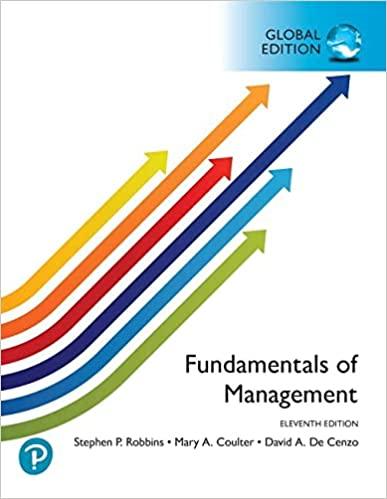Controlling employee performance is a vitally important responsibility of managers. After all, its your employees who are
Question:
Controlling employee performance is a vitally important responsibility of managers. After all, it’s your employees who are working to accomplish established goals,
and you want to see that those goals are being accomplished as planned. So wouldn’t it seem that managing employees’
performance would cover the good and the not-so-good? Well,
some organizations are encouraging managers to lighten up on the harsh feedback and focus only on the positive.59 At consulting firm the Boston Consulting Group, managers now frequently praise employees, encourage them to celebrate even small victories, and conduct performance reviews focusing on an individual employee’s strengths instead of any mistakes that may have happened. And managers are to bring up only one or two areas that require improvement and development. It never used to be this way. When employees didn’t do a good job with a client’s assignment, managers would focus on what went wrong and where and how the employee needed to improve and develop his or her skills.
This shift toward more positive feedback occurred after the company noticed some employees leaving the company and other employees who were still upset for a period of time after a negative performance review. And BCG isn’t the only company taking this approach. Others are increasing the use of positive feedback and minimizing any discussion of the areas that need improvement. At PricewaterhouseCoopers LLP, for instance, managers are asked to have discussions with employees about their future with the organization.
These “career outlook” discussions focus more on where an employee fits in, rather than on where they screwed up.
The company also encourages its staff to send shout-outs via e-cards praising colleagues or subordinates for work done.
Managers have also allocated money to further reward positive accomplishments.
But there are companies not following this positivism trend. These companies take a more “tough-love” approach and don’t shy away from giving negative feedback. For instance, at Netflix, CEO Reed Hasting’s view is that they’re a “pro sports team, not a Little League squad,” noting that “adequate performance gets a generous severance package.” Not everyone in the company is going to get a trophy.
There’s little doubt as to what that company’s performance expectations are.
Discussion Questions
1. Is controlling employee performance an important responsibility of managers? Discuss.
2. Should managers focus only on positive feedback? Explain.
3. What are the risks associated with providing employees only positive feedback and providing limited feedback on areas of improvement?
4. Where would you be more comfortable? An organization with a performance review approach more like the Boston Consulting Group or more like Netflix? Make a list of the pros and cons of both approaches before you make your choice.
What career advice could you take away from this?
Step by Step Answer:

Fundamentals Of Management
ISBN: 9781292307329
11th Global Edition
Authors: Stephen P. Robbins, Mary A. Coulter, David A. De Cenzo





